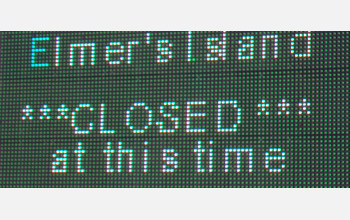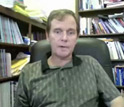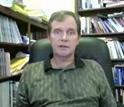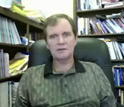News Release 10-122
Gulf Oil Spill: NSF Awards Rapid Response Grant to Study Emotional Response to Disaster
Researchers say way of life in coastal communities is at risk

Researchers say people likely are experiencing an array of emotions in response to Gulf oil spill.
July 15, 2010
View video interviews with Dr. Myron Gutmann (clip 1, clip 2, clip 3), Dr. Christopher Kenny (clip 1, clip 2, clip 3), and Christopher Weber (clip 1, clip 2).
This material is available primarily for archival purposes. Telephone numbers or other contact information may be out of date; please see current contact information at media contacts.
Political scientists at Louisiana State University want to know how your close friends and family influence you during times of crisis. They say the information could be crucial to understanding how people make social and political decisions in the context of a major disaster such as the ongoing Deepwater Horizon oil spill in the Gulf of Mexico.
"Our study is unique in its focus on the ways in which social context shapes individual responses to disaster," said LSU Associate Political Science Professor and co-project lead Christopher Kenny. "Individuals do not experience events such as an oil spill in isolation--and so the previous research, which focused primarily on individual responses, only tells part of the story."
The National Science Foundation (NSF) recently awarded a rapid response grant to Kenny and two other LSU co-project leads: political science professors Kathleen Bratton and Christopher Weber. NSF awarded the grant to study the emotional and behavioral responses of individuals who live in coastal communities contending with the oil spill's consequences.
The researchers argue that the way of life in coastal communities grappling with the oil spill is at risk, and to fully understand the repercussions, one must study not only individual responses to the disaster, but also how social context shapes those responses.
"People are likely experiencing an array of emotions in response to the oil spill," said Kenny. "In this study, we mainly focus on negative emotions--sadness, depression, anxiety, anger, disgust and fear. However, we are also interested in two positive emotions--optimism and hope--that we expect are felt by many in response to the spill."
The researchers also are interested in other ways in which people cope with disaster. The study also asks about social and political trust, assessments of responsibility for the spill, and opinions about the institutions tasked with clean-up.
Investigators will study these questions through surveys of individuals in two coastal Louisiana communities. They will start with a random sample, then supplement it by using snowball techniques wherein initial respondents refer investigators to their friends and family for additional interviews. Researchers will contrast the results with similarly situated neighbors and co-workers to get a better picture of how people use social networks during a crisis to obtain information and make decisions.
Unlike other types of disasters such as earthquakes or hurricanes, residents dealing with the oil spill are not forced to leave their communities in the short term, giving researchers a unique opportunity to examine how established, local, social networks form and shape emotional decisions in response to disaster.
Information from the study may be of interest to public officials and others interested in disaster response and management. This type of information potentially could have benefited response managers after the 9-11 terrorist attacks in New York and Washington D.C., or the D.C. sniper attacks in 2002.
"In general, the better we understand how people cope and respond to a disastrous event, the better able we are to help them deal with the negative consequences of that event," said Kenny.
This NSF grant is one of many Gulf oil spill-related rapid response awards made by the federal agency. NSF's response involves active research in social sciences, geosciences, computer simulation, engineering, biology, and other fields. So far, the Foundation has made more than 60 awards totaling nearly $7 million.
-NSF-
-
View Video
Myron Gutmann explains why the research is important to advancing social science knowledge.
Credit and Larger Version -
View Video
Myron Gutmann clarifies why scientists are interested in the social side of disaster.
Credit and Larger Version -
View Video
Myron Gutmann describes how the research could be used to formulate disaster preparedness policy.
Credit and Larger Version -
View Video
Christopher Kenny describes his team's research in the Gulf of Mexico.
Credit and Larger Version -
View Video
Christopher Weber describes why it's important to study social networks in the context of disaster.
Credit and Larger Version -
View Video
Christopher Kenny gives a glimpse of political questions asked of coastal community residents.
Credit and Larger Version -
View Video
Christopher Weber hypothesizes emotional responses may impact political and volunteering behaviors.
Credit and Larger Version -
View Video
Christopher Kenny says the early response to the survey questions is "quite amazing."
Credit and Larger Version
Media Contacts
Bobbie Mixon, NSF, (703) 292-8485, email: bmixon@nsf.gov
Ashley Berthelot, Louisiana State University, (225) 578-3870, email: aberth4@lsu.edu
Program Contacts
Brian D. Humes, NSF, (703) 292-7284, email: bhumes@nsf.gov
Principal Investigators
Christopher Kenny, Louisiana State University, (225) 578-2546, email: pokenn@lsu.edu
Kathleen A. Bratton, Louisiana State University, (225) 578-1912, email: bratton@lsu.edu
Christopher R. Weber, Louisiana State University, (225) 578-6395, email: crweber@lsu.edu
The U.S. National Science Foundation propels the nation forward by advancing fundamental research in all fields of science and engineering. NSF supports research and people by providing facilities, instruments and funding to support their ingenuity and sustain the U.S. as a global leader in research and innovation. With a fiscal year 2023 budget of $9.5 billion, NSF funds reach all 50 states through grants to nearly 2,000 colleges, universities and institutions. Each year, NSF receives more than 40,000 competitive proposals and makes about 11,000 new awards. Those awards include support for cooperative research with industry, Arctic and Antarctic research and operations, and U.S. participation in international scientific efforts.
Connect with us online
NSF website: nsf.gov
NSF News: nsf.gov/news
For News Media: nsf.gov/news/newsroom
Statistics: nsf.gov/statistics/
Awards database: nsf.gov/awardsearch/
Follow us on social
Twitter: twitter.com/NSF
Facebook: facebook.com/US.NSF
Instagram: instagram.com/nsfgov










